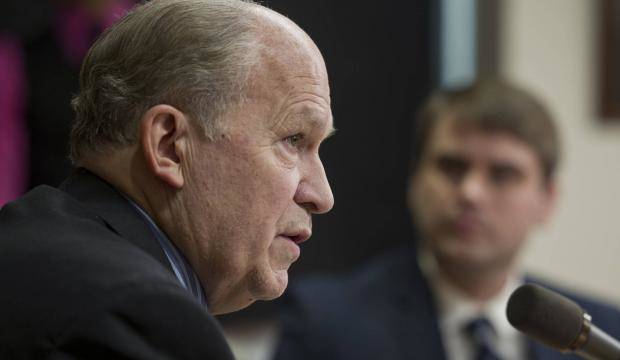Correction: An earlier version of this article said Alyse Galvin was a former school teacher. Galvin worked as a substitute teacher for a period, not as as a full-time teacher. This article has been updated to reflect the change.
With an order released Wednesday morning, the Alaska Supreme Court has allowed independents to challenge Democrats in the Democratic Party’s primary elections.
The decision has major implications for this fall’s statewide elections: Gov. Bill Walker is an independent, and no major Democratic candidate has registered for the fall election. If Walker were to run in (and win) August’s Democratic primary as an independent, he would limit the number of challengers in November’s general election.
“Of course it makes strategic sense for him,” said Jay Parmley, director of the Alaska Democratic Party.
Parmley said the party has not had any discussions with Walker, and his decision remains his own.
“I’m simply waiting. It’s going to be the governor’s decision; it’s not ours,” he said.
By text message, Walker campaign spokeswoman Lindsay Hobson said, “we are still evaluating the decision and have not made any determination of the impact, if any, on the Walker and Mallott campaigns.”
Wednesday’s decision has implications well beyond Walker’s campaign.
Democrats have been seeking to allow independents into their primary elections for more than a year, but the state has opposed their request, citing a law that limits a party’s primary elections to registered members of that political party.
Attorney Jon Choate, arguing on behalf of the state Democratic Party during oral arguments in a September hearing of the Juneau Superior Court, contended that the law unconstitutionally violates the party’s right to associate freely with whom it chooses.
Juneau Superior Court Judge Philip Pallenberg sided with the Democrats in October, and the state appealed to the Supreme Court in November.
In Wednesday’s order, Chief Justice Craig Stowers wrote, “the court necessarily agrees that (the law) unconstitutionally interferes with the Party’s rights of association.”
Wednesday’s short document is not a complete legal opinion — that will come later — but the Alaska Division of Elections isn’t waiting around. Division spokeswoman Samantha Miller said on Wednesday that independents may file for the Aug. 24 Democratic primary immediately. A packet of forms was posted on the division’s website before the end of the day. The filing deadline is June 1.
Parmley, by phone from Anchorage, said Alyse Galvin has already stated her intention to run as an independent in the Democratic primary, something she has said in campaign literature. Galvin plans to run in the Democratic primary for U.S. House of Representatives. The incumbent in that office is Republican Rep. Don Young.
Parmley said he expects state legislative candidates to do the same.
He believes allowing independents into Democratic races is “good for the Democratic Party; I think it’s good for voters in Alaska,” he said. “I think it gives us broader appeal in some areas. It keeps us from jumping through statutory hoops like we have had in the past.”
Casey Steinau, the party’s chair, said in a prepared statement, “As more Alaskans register as non-partisan or undeclared, it just makes sense for those who agree with the values of the Alaska Democratic Party be allowed to seek our Party’s nomination, regardless of how they are registered to vote.”
Democrats have supported independent candidates before, Parmley said, and allowing those candidates into the Democratic primary amounts to the same thing.
“It’s just that now, it’s much more straightforward. If you want to run as an undeclared or nonpartisan, and you want our support, the best way is to run in our primary,” he said.
The Democratic Party wasn’t the only political organization hailing Wednesday’s announcement. Republican Party Chairman Tuckerman Babcock also praised the decision by the Supreme Court.
In December, Alaska’s Republican leaders sought to prevent Rep. Gabrielle LeDoux, R-Anchorage; Rep. Paul Seaton, R-Homer; and Rep. Louise Stutes, R-Kodiak from running for re-election as Republicans in the party primary because they have caucused with a predominantly Democratic coalition in the Alaska House of Representatives.
“The Republican party just doesn’t want to offer them as Republican candidates,” Babcock said by phone.
He said the three are welcome to run for election, just not under the Republican label.
Before Wednesday’s decision, the Division of Elections had said the state party couldn’t deny the three that label. Now, it isn’t clear. A division spokeswoman referred questions to the Alaska Department of Law. The spokeswoman for the Department of Law did not provide any new information.
Babcock said he will be consulting an attorney.
“I’ll be pursuing that with full vigor here,” he said.
As for the Democrats, Parmley said there’s not much to do except find the best candidates for office. He’s not worried that the decision could permit candidates who don’t strictly hew to the party line.
“At the end of the day, this is where I sort of go back to: If you line up to run in our primary, regardless of your registration, I still believe if there’s a competitive primary, that at the end of the day, the voters who participate in the Democratic primary make the ultimate decision,” he said.
• Contact reporter James Brooks at jbrooks@juneauempire.com or 523-2258.

